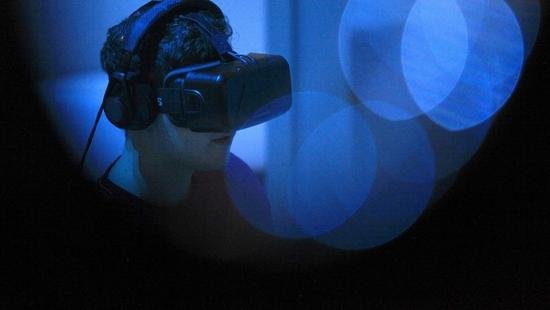Facebook CEO Mark Zuckerberg stated at the Oculus Connect conference in San Jose, Calif., on Thursday that Facebook is developing a more advanced head-mounted virtual reality (VR) product than Samsung Gear VR, based on location tracking technology. , but it does not need to be connected to a PC like the Oculus Rift. "We believe there is a sweet spot between these products for a new device." But he also warned developers not to be too excited - this product is not yet ready for release.
Zuckerberg showed off a prototype of a stand-alone VR helmet by video. Its hallmark feature is location tracking. There is a man in the video wearing this prototype, and it is free to move around without a cable. However, he did not explicitly disclose the working model of this product.
The video shows that the new helmet appears to be a modified version of Rift with a calculation module embedded in the back. Location tracking technology enables the new helmet to know its position in physical space and adjust the display content accordingly. When viewing 360-degree video, the user can only view the content of a spherical perspective at a fixed point, but the position tracking technology enables the user to enjoy different viewing angles of the visual experience.

Location tracking technology previously appeared only in high-end virtual reality helmets—such as the Oculus Rift, HTC Vive, and PS VR—but the new helmets demonstrated signified that Oculus will shrink the gap between mobile and high-end virtual reality experiences.
Oculus is facing increasingly fierce competition in the field of mobile virtual reality helmets, especially from Google's competition. Earlier this week, Google released its DaydreamView helmet. In November last year, Oculus and Samsung jointly released a new generation of Gear VR helmets. The prototype of the new virtual reality helmet shows that Oculus is no longer satisfied with the mobile virtual reality experience relying on smart phones, considering providing users with a stand-alone virtual reality experience.
Although the new device is in the process of development, the company stated that they have already cooperated with AMD and Nvidia to allow the Oculus Rift to work with cheaper computers. For example, a Cyberpower computer with an AMD graphics chip starts at $499, but it can still be used with Rift. The company also announced that the Oculus Touch handle will begin shipping in December and will begin pre-sales on October 10 for $199.
Facebook has also shown some avatars that can be used to customize the image of a person in real life so that they can be given a specific identity in a virtual reality environment. These avatars can read the user's hand movements and expressions, hoping to provide a sense of social presence as they interact with other avatars through the virtual world.
Zuckerberg said that the next step in virtual reality is social software. Facebook's Oculus now allows users to set up "rooms" to watch movies, play games, or chat with avatar friends. "Because of the sense of being there, virtual reality is the perfect platform for people-oriented." Zuckerberg said, "You feel really co-existing with people in another place."
Zuckerberg said that Oculus has spent 250 million US dollars to help developers improve the virtual reality experience so far, and plans to invest another 250 million US dollars in the future, of which about 10 million US dollars will be explicitly used to improve the educational experience.

Facebook also released a browser called Carmel that allows users to surf the Web in a virtual reality environment. The company also launched a 49-mm headset designed to improve virtual reality audio.
In addition to Zuckerberg, several Oculus executives also attended the meeting, but Oculus founder Palmer Luckey did not attend. Previous reports said that Raj had supported an "anti-Hillary" network activity. Raja then publicly apologized on September 23. Oculus said in the statement: "Palmer does not want to distract everyone, so he chose not to participate in the event."